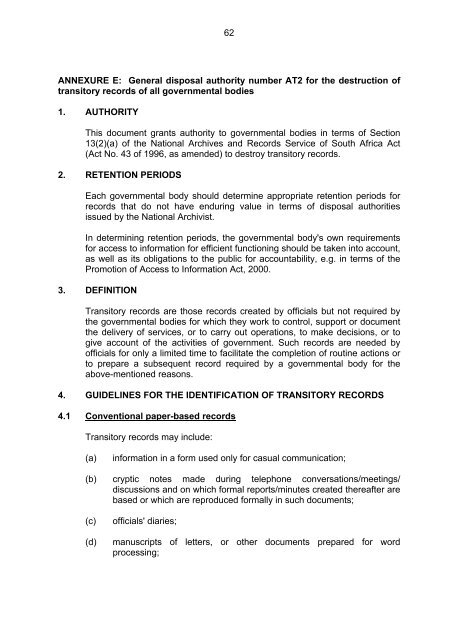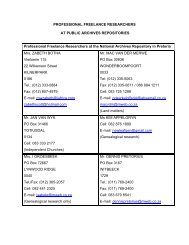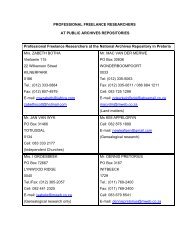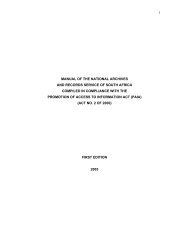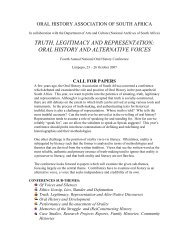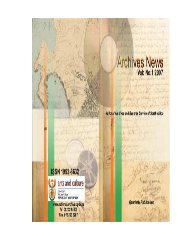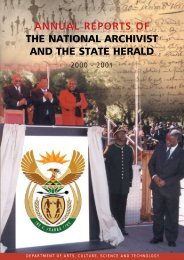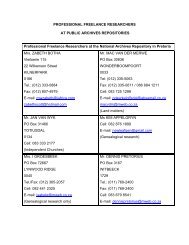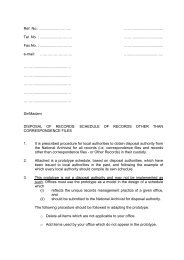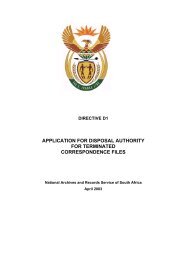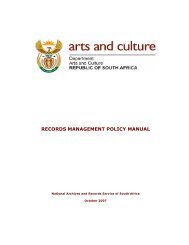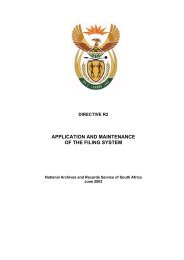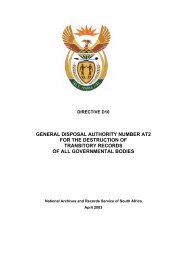managing electronic records in governmental bodies - National ...
managing electronic records in governmental bodies - National ...
managing electronic records in governmental bodies - National ...
You also want an ePaper? Increase the reach of your titles
YUMPU automatically turns print PDFs into web optimized ePapers that Google loves.
62<br />
ANNEXURE E: General disposal authority number AT2 for the destruction of<br />
transitory <strong>records</strong> of all <strong>governmental</strong> <strong>bodies</strong><br />
1. AUTHORITY<br />
This document grants authority to <strong>governmental</strong> <strong>bodies</strong> <strong>in</strong> terms of Section<br />
13(2)(a) of the <strong>National</strong> Archives and Records Service of South Africa Act<br />
(Act No. 43 of 1996, as amended) to destroy transitory <strong>records</strong>.<br />
2. RETENTION PERIODS<br />
Each <strong>governmental</strong> body should determ<strong>in</strong>e appropriate retention periods for<br />
<strong>records</strong> that do not have endur<strong>in</strong>g value <strong>in</strong> terms of disposal authorities<br />
issued by the <strong>National</strong> Archivist.<br />
In determ<strong>in</strong><strong>in</strong>g retention periods, the <strong>governmental</strong> body's own requirements<br />
for access to <strong>in</strong>formation for efficient function<strong>in</strong>g should be taken <strong>in</strong>to account,<br />
as well as its obligations to the public for accountability, e.g. <strong>in</strong> terms of the<br />
Promotion of Access to Information Act, 2000.<br />
3. DEFINITION<br />
Transitory <strong>records</strong> are those <strong>records</strong> created by officials but not required by<br />
the <strong>governmental</strong> <strong>bodies</strong> for which they work to control, support or document<br />
the delivery of services, or to carry out operations, to make decisions, or to<br />
give account of the activities of government. Such <strong>records</strong> are needed by<br />
officials for only a limited time to facilitate the completion of rout<strong>in</strong>e actions or<br />
to prepare a subsequent record required by a <strong>governmental</strong> body for the<br />
above-mentioned reasons.<br />
4. GUIDELINES FOR THE IDENTIFICATION OF TRANSITORY RECORDS<br />
4.1 Conventional paper-based <strong>records</strong><br />
Transitory <strong>records</strong> may <strong>in</strong>clude:<br />
(a)<br />
<strong>in</strong>formation <strong>in</strong> a form used only for casual communication;<br />
(b) cryptic notes made dur<strong>in</strong>g telephone conversations/meet<strong>in</strong>gs/<br />
discussions and on which formal reports/m<strong>in</strong>utes created thereafter are<br />
based or which are reproduced formally <strong>in</strong> such documents;<br />
(c)<br />
(d)<br />
officials' diaries;<br />
manuscripts of letters, or other documents prepared for word<br />
process<strong>in</strong>g;


